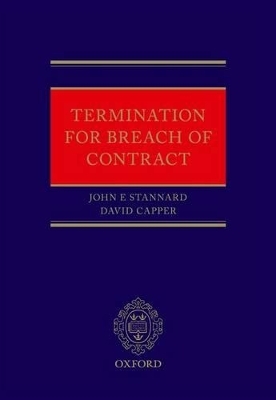
Termination for Breach of Contract
Oxford University Press (Verlag)
978-0-19-969597-3 (ISBN)
- Titel ist leider vergriffen;
keine Neuauflage - Artikel merken
Providing a comprehensive and detailed treatment of termination as a remedy for breach of contract, this book gives a current account of the law and explains this complex area in a practical context.
The book is divided into four parts. The first section sets out to analyse what is involved in termination and looks at some of the difficulties surrounding the topic, before going on to explain the evolution of the present law and its main principles. The second section provides a thorough analysis of the two key topics of breach and termination. Breach is defined in terms of a failure, without good excuse, to perform an obligation under the contract, and the various aspects of this
definition are explained in the light of the relevant authorities. In the following chapter in the section, termination is defined in terms of an election by the promisee, in consequence of a breach by the promisor, to claim discharge from his or her own primary obligations under the contract. This process,
which can also be seen as a major contractual remedy in its own right, is distinguished from other processes with which it has a close relationship, most notably the right to withhold performance and discharge under the doctrine of frustration.
The third section addresses the question when the right to terminate for breach arises. The law gives two answers to this question - when the term broken is classified as a 'condition' or when a 'fundamental' breach has occurred. The nature of a 'condition' in this sense is explained, and the criteria for identifying when a term should be classified as such is set out. Similarly, the criteria for identifying a fundamental breach is discussed, as is the difficult relationship between the
concepts of fundamental breach and repudiation and the doctrine of anticipatory breach.
The fourth and final section considers the consequences of the promisee's election whether to terminate or not. In this section the legal effects of termination with regard to the obligations and remedies available to the promisee and the promisor, and also its effect on the application of other terms in the contract such as exemption clauses, are analysed. The measure of damages available to the promisee following termination, most notably damages 'on the footing of repudiation' or damages
for 'loss of the bargain' is also considered here alongside other general principles governing damages in this context. The final chapter examines the legal consequences of affirmation, once again both with regard to the promisee and the promisor, with particular emphasis on the extent of the
promisee's right to enforce the performance of the contract by way of an action for an agreed sum or an action for specific performance.
John Stannard graduated from Oxford University in 1973 with a BA in Jurisprudence, and obtained the degree of BCL the following year. From 1974 to 1976 he was a lecturer in Roman Law at the University of Aberdeen, and has been on the staff of Queen's University since 1977. David Capper obtained his LL.B from Queen's University Belfast in 1982 and was taught by John Stannard during his undergraduate studies. In 1984 he obtained the degree of LL.M from Cambridge University and later the same year he was called to the Bar of Northern Ireland. After practising for five years he was appointed to a Lectureship in Law at Queen's, was promoted to Senior Lecturer in 1996, and to Reader in 2002.
PART I: INTRODUCTION ; 1. The Nature of Termination ; 2. The Genesis of Termination ; PART II: BREACH AND TERMINATION ; 3. Breach of Contract ; 4. The Process of Termination ; PART III: THE RIGHT TO TERMINATE ; 5. Breach of Condition ; 6. Fundamental Breach ; 7. Repudiation and Anticipatory Breach ; 8. Express Rights of Termination ; PART IV: TERMINATION AND AFFIRMATION ; 9. Discharge of Primary Obligations ; 10. Damages on Termination ; 11. Restitutionary Relief ; 12. The Consequences of Affirmation
| Erscheint lt. Verlag | 25.3.2014 |
|---|---|
| Verlagsort | Oxford |
| Sprache | englisch |
| Maße | 181 x 250 mm |
| Gewicht | 868 g |
| Themenwelt | Recht / Steuern ► EU / Internationales Recht |
| Recht / Steuern ► Privatrecht / Bürgerliches Recht | |
| Recht / Steuern ► Wirtschaftsrecht ► Handelsrecht | |
| ISBN-10 | 0-19-969597-0 / 0199695970 |
| ISBN-13 | 978-0-19-969597-3 / 9780199695973 |
| Zustand | Neuware |
| Haben Sie eine Frage zum Produkt? |
aus dem Bereich


